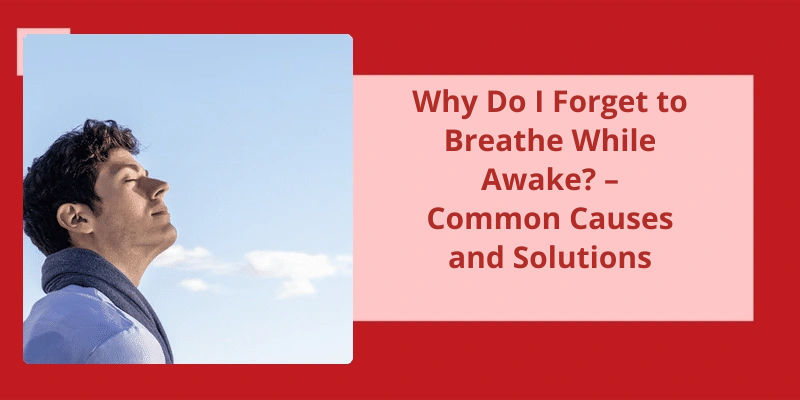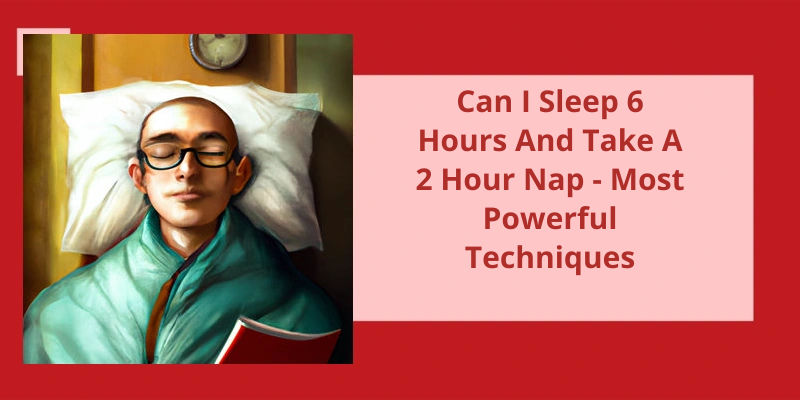Have you ever found yourself captivated by a task or deeply engrossed in thought, only to suddenly realize that you’ve forgotten to take a breath? It's a peculiar sensation that can leave you momentarily startled and wondering why your body seems to forget this most fundamental and automatic function. Rest assured, this phenomenon isn’t uncommon and can be attributed to a variety of factors. In this article, we will explore some of the common causes behind forgetting to breathe while awake and delve into potential solutions to help you overcome this perplexing issue. So, let's dive in and unravel the mystery behind this peculiar occurrence.
Why Do I Randomly Forget to Breathe?
One possible cause for the random forgetting to breathe while awake may be due to a disruption or malfunction in the brains signaling system. The brain is responsible for controlling the muscles involved in our breathing process, and if theres a temporary lapse or miscommunication, it can result in forgetfulness to breathe. This kind of interruption in breathing is often seen in people with central sleep apnea.
It’s important to note that central sleep apnea is different from obstructive sleep apnea, which is caused by blocked airways. In central sleep apnea, the problem lies within the brains signaling system rather than physical obstructions. This can lead to episodes where the individual momentarily stops breathing or forgets to breathe while they’re awake. Understanding this distinction is crucial in finding the appropriate solutions for this issue.
To address the problem of forgetting to breathe while awake, a thorough evaluation of the individuals overall health and medical history is necessary. Consulting with a healthcare professional, such as a neurologist or sleep specialist, can help in identifying any underlying conditions or neurological abnormalities that may be contributing to this issue. Treatment options may vary depending on the specific cause identified through this evaluation.
In some cases, lifestyle modifications can greatly improve the symptoms of central sleep apnea and help prevent the occurrences of forgetting to breathe. This can include maintaining a consistent sleep schedule, avoiding stimulants like caffeine before bedtime, and practicing relaxation techniques to reduce stress. For more severe cases, continuous positive airway pressure (CPAP) therapy or other breathing assistance devices may be recommended.
Identifying any underlying conditions and addressing them promptly can help alleviate the symptoms and improve overall well-being.
The Impact of Stress and Anxiety on Breathing Patterns and How to Manage These Factors to Prevent Forgetting to Breathe.
- The physiological effects of stress and anxiety on breathing patterns
- How stress and anxiety can lead to shallow and rapid breathing
- The importance of deep breathing techniques in managing stress and anxiety
- The role of mindfulness and meditation in regulating breathing patterns
- Tips for managing stress and anxiety to prevent forgetting to breathe
- Practicing diaphragmatic breathing exercises for relaxation
- Seeking professional help if stress and anxiety become overwhelming
- Developing a self-care routine that includes stress-reducing activities
- Creating a calm and soothing environment to promote deep breathing
- Using visual cues or reminders to encourage regular breathing breaks
This habit can lead to overbreathing and hyperventilation, which can make it difficult to breathe properly. It’s important to understand the balance between consciously regulating your breathing and allowing it to flow naturally for optimal respiratory function.
Can Thinking About Breathing Make It Hard to Breathe?
This hyper-focus on your breath can lead to an imbalance in oxygen and carbon dioxide levels in your body, which can result in sensations of dizziness, shortness of breath, and even chest pain. Additionally, when you constantly think about your breathing, it can create a cycle of anxiety and hypervigilance, further exacerbating the problem.
In some cases, the fear of not being able to breathe properly can also contribute to the development of panic attacks. This fear can be triggered by a previous traumatic experience, such as choking or suffocation, or it can stem from a general anxiety disorder. When you constantly worry about your breathing, your body enters a state of heightened alertness, leading to increased stress and tension, which can make it even harder to breathe.
For individuals who suffer from chronic respiratory conditions such as asthma or chronic obstructive pulmonary disease (COPD), the fear of not being able to breathe can be especially distressing. This heightened awareness of their breath can cause them to become hyper-vigilant and easily triggered by any changes in their breathing patterns.
To address this issue, it’s important to retrain your brain to trust your bodys natural ability to regulate your breathing. This can be achieved through various relaxation techniques, such as deep breathing exercises, meditation, and mindfulness practices. By redirecting your focus away from your breath and onto something calming and soothing, you can help reduce the anxiety associated with breathing difficulties.
It may also be helpful to seek professional help from a therapist or counselor who specializes in anxiety disorders. They can help you identify and address any underlying fears or trauma that may be contributing to your heightened awareness of your breath. Cognitive-behavioral therapy (CBT) techniques can be particularly effective in helping you challenge and change negative thought patterns related to breathing difficulties.
It’s important to seek appropriate support to help reframe your thoughts and regain confidence in your bodys ability to regulate your breathing. With practice and patience, you can overcome this challenge and find relief from the constant worry about your breath.
It’s important to understand what happens when you breathe without thinking. When your body automatically regulates your breath, it’s a subconscious process called automatic or involuntary breathing. However, certain factors can disrupt this pattern and lead to various sensations like shortness of breath, anxiety, or lightheadedness. This condition is commonly referred to as hyperventilation or overbreathing.
What Is It Called When You Breathe Without Thinking?
When you breathe without thinking, it’s called automatic or involuntary breathing. This is a natural physiological process controlled by the autonomic nervous system, specifically the medulla oblongata in the brainstem. Breathing is usually an unconscious action, allowing your body to receive the necessary oxygen and rid itself of carbon dioxide. Your respiratory system, including the diaphragm and intercostal muscles, works together effortlessly to maintain a steady and controlled breathing pattern.
However, certain circumstances can disrupt this automatic process, leading to changes in your breathing pattern. One common occurrence is known as hyperventilation or overbreathing. Hyperventilation typically happens when you start to breathe too rapidly or deeply, causing excessive intake of oxygen and elimination of carbon dioxide. This can result in a temporary imbalance in the levels of oxygen and carbon dioxide in your blood, leading to symptoms such as shortness of breath, dizziness, lightheadedness, tingling sensations, and even fainting.
Various factors can trigger hyperventilation, including anxiety, stress, panic attacks, and certain medical conditions such as asthma or chronic obstructive pulmonary disease (COPD). Additionally, environmental factors like high altitude or extreme temperatures can also affect your breathing pattern. It’s important to note that hyperventilation isn’t a disease itself, but rather a response to these triggers.
To address hyperventilation, it’s crucial to identify and address the underlying cause. Stress reduction techniques like deep breathing exercises, meditation, or yoga can help calm your mind and regulate your breathing. Taking slow, deliberate breaths and focusing on your exhales can help rebalance your bloods oxygen and carbon dioxide levels. If anxiety or panic attacks are the root causes, seeking professional help from a therapist or psychologist may be beneficial.
Furthermore, practicing diaphragmatic breathing, also known as belly breathing, can aid in restoring a more natural breathing pattern. This technique involves consciously engaging your diaphragm and taking deep breaths from your belly, rather than shallow breaths from your chest. Regular exercise, maintaining a healthy lifestyle, and avoiding triggers like smoking or excessive caffeine intake can also contribute to overall respiratory well-being.
By understanding the causes and implementing techniques to address these triggers, you can regain control over your breathing and alleviate the associated symptoms. Remember, remaining mindful of your breath and taking steps to promote a healthy respiratory system is essential for your overall well-being.
It’s a curious phenomenon how our bodies react to various emotions, and one common manifestation is the act of holding our breath. Whether it’s stress, anxiety, excitement, or any other strong sentiment, many of us find ourselves involuntarily holding our breath without even being aware of it. The unconscious urge to momentarily suspend our breath seems to be deeply intertwined with the complex tapestry of emotions we experience in our daily lives.
Is Holding Your Breath a Form of Anxiety?
Holding your breath can indeed be a form of anxiety. It often happens without conscious awareness, as a reaction to stress or emotional turmoil. When feeling tense or overwhelmed, many people automatically hold their breath as a way to exert control over their body and emotions.
These emotional states can trigger a similar response, causing the body to tighten up and the breath to become shallow or even halted momentarily. When we’re in these heightened emotional states, our bodys natural breathing rhythm may become disrupted, leading to the sensation of forgetting to breathe while awake.
There are various causes for this phenomenon. One possibility is that when we hold our breath, our focus becomes fixated on the immediate situation or emotion, causing us to disconnect from our bodys basic function of breathing. Another explanation could be that stress and tension in the body disrupt the normal flow of breathing, resulting in unintentional breath-holding. It’s also worth considering that certain individuals may have learned to hold their breath as a coping mechanism in response to past traumatic events or challenging experiences.
To address this issue, it’s beneficial to cultivate mindfulness and body awareness. Developing a regular mindfulness or meditation practice can help you become more attuned to your breath and body sensations, enabling you to recognize and release any unconscious breath-holding patterns. Additionally, implementing stress reduction techniques such as deep breathing exercises, progressive muscle relaxation, or engaging in physical activities that promote relaxation, like yoga or tai chi, can help regulate your breathing and reduce the likelihood of breath-holding episodes.
Remember, if you find yourself frequently forgetting to breathe or experiencing significant anxiety symptoms, it’s important to consult with a healthcare professional. They can provide a comprehensive assessment and offer personalized strategies to manage anxiety and improve your overall well-being.
Strategies for Managing Breath-Holding Episodes in Specific Situations, Such as Public Speaking or High-Stress Environments.
- Breathe deeply and slowly before speaking in public.
- Practice relaxation techniques, such as meditation or deep breathing exercises, to help manage stress and anxiety.
- Avoid caffeine and other stimulants that can increase heart rate and induce breath-holding episodes.
- Visualize positive outcomes and focus on calming thoughts to reduce the likelihood of breath-holding episodes.
- If a breath-holding episode occurs, try to stay calm and take slow, deliberate breaths to regain control of your breathing.
- Consider seeking professional help, such as therapy or counseling, to address underlying causes of stress or anxiety that may contribute to breath-holding episodes.
- Engage in regular exercise and practice stress-management techniques to build resilience and improve overall well-being.
Source: Don’t Hold Your Breath – Nautilus Behavioral Health
By consciously focusing on your breathing, you can activate your body’s natural relaxation response. This shift in attention allows your mind to quiet down and promotes a state of calmness. The physical benefits, such as lower heart rate and blood pressure, go hand in hand with the overall calming effect on your mind. Taking the time to engage in deep, diaphragmatic breathing can serve as a powerful tool for managing stress and anxiety.
Why Do I Have to Focus on Breathing?
Focusing on your breathing can be beneficial for a variety of reasons. When we’re stressed or anxious, our sympathetic nervous system is activated, preparing us for a potential threat. This can result in increased heart rate, rapid breathing, and a sense of unease.
Deep, diaphragmatic breathing has been shown to activate the parasympathetic nervous system, which is responsible for the bodys rest and digest response. By intentionally slowing down and deepening our breaths, we send calming signals to our mind, which then translate into physical relaxation. Our heart rate and blood pressure decrease, and our overall sense of calm is heightened.
In our busy lives, our minds are often racing with thoughts about the past or future, and this can lead to a sense of disconnectedness and overwhelm. By shifting our attention to our breath, we can anchor ourselves in the present moment and cultivate a sense of mindfulness.
When we experience physical discomfort, our instinct is often to tense up and resist the sensation. However, this can actually intensify the pain. By directing our attention to our breath and consciously relaxing our muscles, we can create a sense of ease and reduce the intensity of the pain.
Overall, focusing on our breath can have a profound impact on our physical and mental well-being. It’s a simple yet powerful tool that can be utilized in various situations to bring us back to a state of calm and balance.
The Science Behind How Deep Breathing Affects the Body and Mind
Deep breathing, also known as diaphragmatic breathing or belly breathing, has a profound impact on both the body and mind.
When we engage in deep breathing, we activate the diaphragm, a dome-shaped muscle located beneath the lungs. This muscle contracts and expands, allowing us to take in more oxygen and expel more carbon dioxide.
In terms of the body, deep breathing triggers a relaxation response. It helps to slow down the heart rate, lower blood pressure, and reduce stress hormones like cortisol. Deep breathing also promotes better digestion, improves lung function, and boosts the immune system.
Mentally, deep breathing has a calming effect. It activates the parasympathetic nervous system, which induces a state of relaxation and promotes feelings of tranquility and well-being. Deep breathing can help alleviate anxiety, improve focus and concentration, and enhance overall mental clarity.
To experience the benefits of deep breathing, try practicing it regularly. Find a quiet and comfortable space, sit or lie down, and take slow, deep breaths, letting your abdomen expand as you inhale and contract as you exhale. Incorporating deep breathing into your daily routine can bring about a sense of calm and rejuvenation.
Conclusion
Understanding the underlying factors such as stress, anxiety, and distractions can help individuals identify potential solutions. Incorporating relaxation techniques, maintaining a healthy lifestyle, seeking professional help if needed, and practicing mindfulness can significantly aid in managing and preventing this occurrence. It’s crucial to prioritize our well-being and ensure proper breathing to maintain optimum physical and mental health throughout our daily lives.






